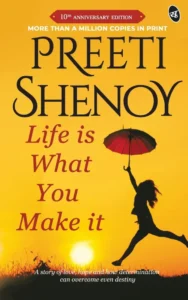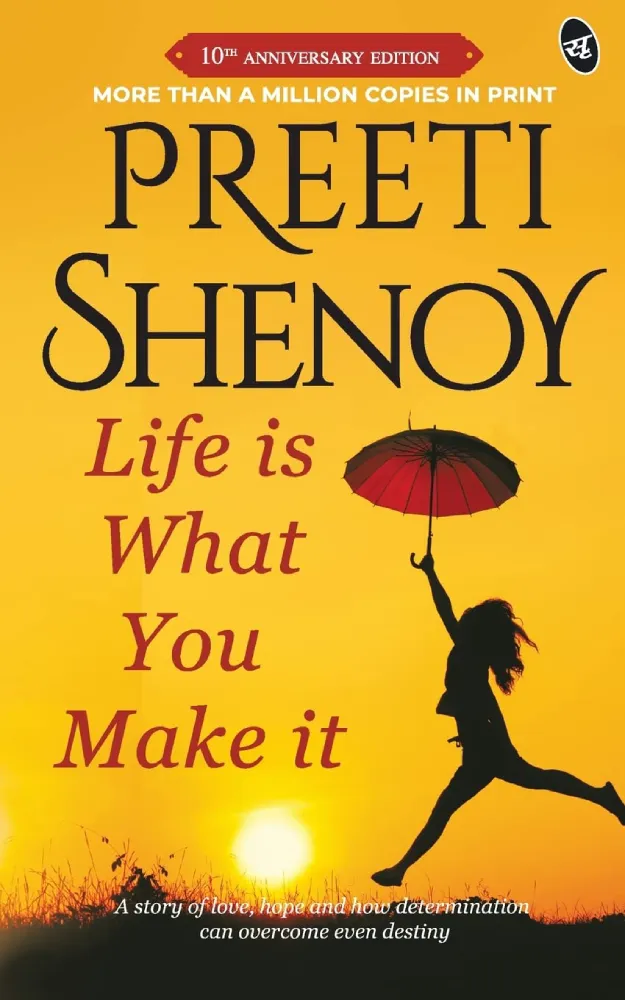In a country like India, where depression and anxiety are often stigmatized and viewed as a weakness, Preeti Shenoy’s Life is What You Make It underscores the crucial need for open conversations about mental health and the strength it takes to address these challenges.
If categorized, Life is What You Make It would fall under contemporary fiction—simple and relatable. The story follows Ankita Sharma, a promising and beautiful girl from a middle-class, conservative family in Cochin (Kerala). Like most students in India, Ankita transitions from school to college, staying in touch with her school friend Vaibhav through letters, as mobile phones weren’t widely popular then.
Ankita quickly finds her place at her prestigious college and makes new friends. During a college cultural fest, she meets Abhi, and their relationship blossoms over time. However, when it’s time to choose between love and her career, Ankita prioritizes her future, earning a spot at one of Mumbai’s most prestigious institutions.
This decision leads to a tragic turn of events—Abhi, unable to cope with her departure, takes his own life. Ankita moves to Mumbai, determined to move forward, but the guilt and grief over Abhi’s death begin to consume her. Slowly, she spirals into a deep depression, so severe that she attempts suicide twice. From being a top-performing student, Ankita loses even the ability to read and write.
Lastly, Ankita is admitted to the National Institute of Mental Health in Bangalore, where her journey toward recovery begins. The book’s second half portrays her struggles, resilience, and eventual path to healing, making this a story of survival and self-discovery.
My Words….
What I have written above may sound common. Still, while Life is What You Make It explores some challenging incidents, many of the struggles depicted arise from decisions that, in hindsight, could have been made differently—not just by Ankita but by those around her. For instance, during the college’s interstate cultural fest, Ankita’s friends party in a hotel and spend time in the boys’ rooms. When this comes to light, the college authorities suspend them. This incident highlights the impulsiveness of youth and the impact of decisions made without fully understanding their consequences.
Reflecting on the book, I found many aspects relatable, especially the portrayal of Ankita’s parents. In Indian culture, there is often a rigid mold that everyone is expected to follow. Parents, out of concern for their children’s well-being, tend to keep them tightly bound to these norms. While this can be protective, it sometimes prevents children from expressing themselves freely or adapting to changing times.
Ankita’s journey is also shaped by her relationships and friendships. Her decision to write letters to Vaibhav without her parents’ knowledge and her evolving bond with Abhi add complexity to the story, reflecting the challenges of navigating relationships during formative years. Similarly, her friends’ actions, such as leaving her alone with Abhi during a planned situation, highlight the unintended consequences of youthful behavior. While their intentions may not have been harmful, the lack of maturity and foresight creates complications for Ankita.
Despite these moments of conflict, the book’s real strength lies in its portrayal of mental health. Life is What You Make It sheds light on bipolar disorder, a condition often misunderstood or ignored in society. The recovery period is depicted with sensitivity, showing Ankita’s struggles and the gradual understanding and support she receives from her parents.
Dr. Madhusudan, who plays a pivotal role in Ankita’s recovery, is one of the most inspiring characters in the book. His empathetic and patient approach helps Ankita heal and reminds readers of the importance of seeking professional help and providing a supportive environment for those in need.
This book is not just a story; it’s a lesson. It helps you understand bipolar disorder and encourages reflection on the importance of timely support and awareness. If you know someone struggling with mental health issues, Life is What You Make It is a must-read for gaining insight into their journey and learning how you can help.







